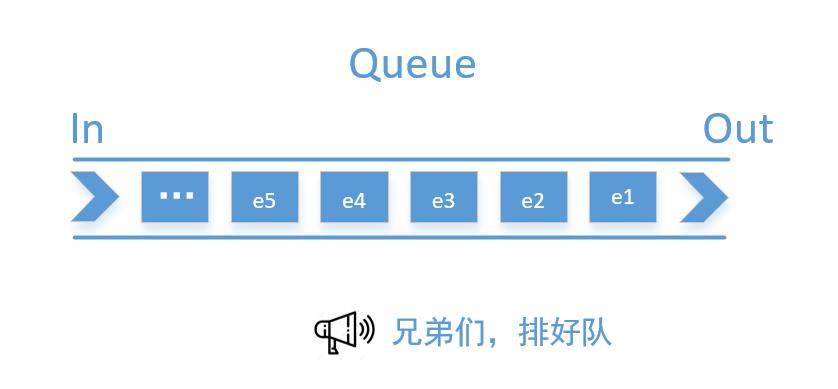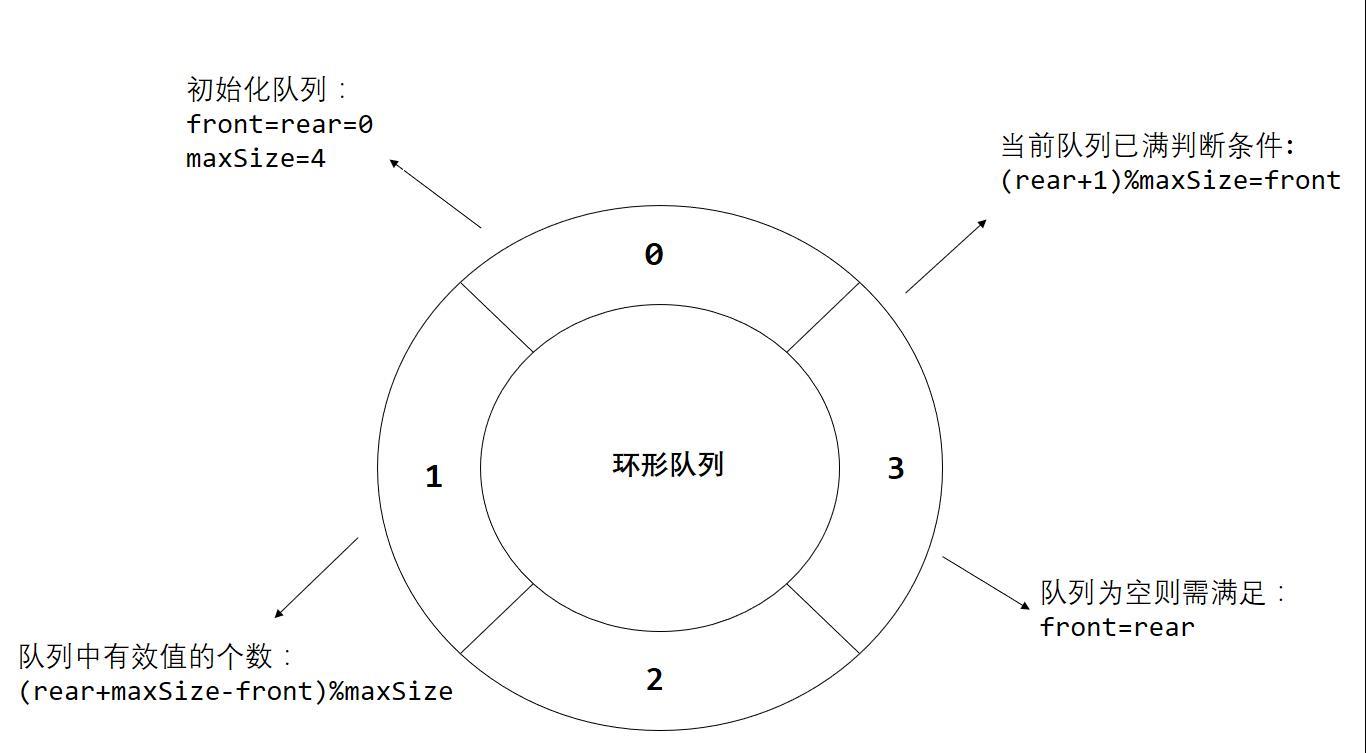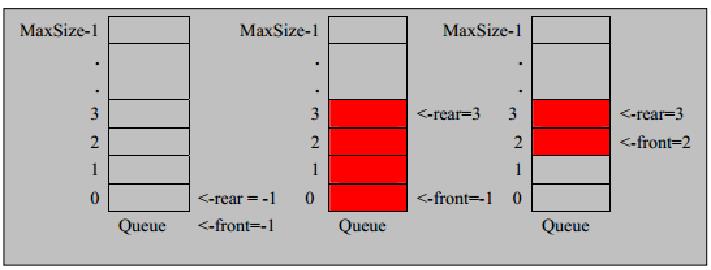使用数组模拟普通队列,环形队列,(Java数据结构之队列)
Posted 孟挽周
tags:
篇首语:本文由小常识网(cha138.com)小编为大家整理,主要介绍了使用数组模拟普通队列,环形队列,(Java数据结构之队列)相关的知识,希望对你有一定的参考价值。

队列
- 队列是一个有序列表,可以用
数组(顺序存储)或是链表(链式存储)来实现。 - 遵循
先入先出的原则。即:先存入队列的数据,要先取出。后存入的要后取出。

使用数组模拟队列
- 队列本身是有序列表,若使用数组的结构来存储队列的数据,则队列数组的声明如下图,其中maxSize是该队列的最大容量。
- 因为队列的输出,输入是分别从前后端来处理,因此需要两个变量front及rear分别记录队列前后端的下标,front会随着数据输出从而改变,而rear则是随着数据输入而改变。
如图所示:
思路分析:
当我们将数据存入队列时称为
addQueue,addQueue的处理需要有两个步骤
- 将尾指针往后移:
rear+1,当front == rear[空] - 若尾指针
rear小于队列的最大下标maxSize - 1,则将数据存入rear所指的数组元素中,否则无法存入数据。rear == maxSize -1[队列满]。
代码实现:
使用数组模拟队列,编写一个ArrayQueue类
class ArrayQueue{
private int maxSize; //表示数组的最大容量
private int front; //队列头
private int rear; //队列尾
private int [] arr; //该数组用于存放数据,模拟队列
//创建队列的构造器
public ArrayQueue(int arrMaxSize){
this.maxSize=arrMaxSize;
this.arr=new int[this.maxSize];
this.front=-1; //指向队列头部,分析出front是指向队列头的前一个位置。
this.rear=-1; //指向队列尾,指向队列尾的数据(就是队列中最后一个数据)。
}
//判断队列是否满
public boolean isFull(){
return this.rear == this.maxSize-1;
}
//判断队列是否为空
public boolean isEmpty(){
return this.rear == this.front;
}
//添加数据到队列
public void addQueue(int n){
if (isFull()){
System.out.println("队列满,不能加入数据");
return;
}
this.rear++; //让rear后移
this.arr[rear]=n;
}
//获取队列的数据,出队列
public int getQueue(){
//判断队列是否为空
if (isEmpty()){
//通过抛出异常
throw new RuntimeException("队列空,不能取数据");
}
front++; //front后移
return arr[front];
}
//显示队列的所有数据
public void showQueue(){
if (isEmpty()){
System.out.println("队列空,没有数据");
}
for (int i=0;i<arr.length;i++){
System.out.printf("arr[%d]=%d\\n",i,arr[i]);
}
}
//显示队列的头数据,注意:不是取数据
public int headQueue(){
//判断
if (isEmpty()){
throw new RuntimeException("队列空的,没有数据");
}
return arr[front+1];
}
}
对模拟队列进行测试
public static void main(String[] args) {
ArrayQueue arrayQueue= new ArrayQueue(3);
Scanner inpunt =new Scanner(System.in);
Boolean b=true;
do {
switch (inpunt.nextInt()){
case 1:{
try {
System.out.println("显示队列所有数据");
arrayQueue.showQueue();
}catch (Exception e){
e.printStackTrace();
}
break;
}
case 2:{
System.out.println("添加数据到队列");
arrayQueue.addQueue(inpunt.nextInt());
break;
}
case 3:{
try {
System.out.println("显示队列的头数据");
int headQueue = arrayQueue.headQueue();
System.out.println("队列头:"+headQueue);
}catch (Exception e){
e.printStackTrace();
}
break;
}
case 4:{
try {
System.out.println("从队列中取数据");
int queueQueue = arrayQueue.getQueue();
System.out.println("取数据:"+queueQueue);
}catch (Exception e){
e.printStackTrace();
}
break;
}
default:{
b=false;
}
}
}while (b);
}
- 测试1:添加数据并显示队列所有数据
可以看出现在队列中添加了三个数据分别为 10,20,30

- 测试2:查看头数据,然后取出数据后,再次查看头数据
因为队列遵循先进先出的原则,这边取完数据再查看队列,头数据为第二次添加的数据。

- 测试3:取出所有数据在添加数据。
注意看这里,当我们数据取完后,在添加数据就会出现问题。

问题分析及优化:
- 目前我们的数组使用一次就不能用了,没有达到复用的效果。
- 我们可以将这个数组使用算法改进成一个环形的队列。
使用数组模拟环形队列

思路分析
- front变量的含义做一个调整,front就指向队列的第一个元素,也就是说 arr[front]就是队列的第一个元素,front的初始值 = 0;
- rear 变量的含义也做一个调整,rear指向队列的最后一个元素的最后一个位置。因为希望空出一个空间做为约定。rear的初始值也 = 0;
- 当队列满时,条件是
(rear+1)% maxSize = front [满] - 当队列为空的条件是
rear == front空。 - 队列中有效数据的个数
(rear+maxSize-front)%maxSize// rear = 1 front = 0
代码实现
对前面的数组模拟队列进行优化,充分利用数组,因此将数组看作是一个环形的。(通过取模的方式来实现即可)
class CircleArray{
private int maxSize; //表示数组的最大容量
//front变量的含义做一个调整,front就指向队列的第一个元素,也就是说 arr[front]就是队列的第一个元素,front的初始值 = 0;
private int front;
//rear 变量的含义也做一个调整,rear指向队列的最后一个元素的最后一个位置。因为希望空出一个空间做为约定。rear的初始值也 = 0;
private int rear;
private int [] arr; //该数组用于存放数据,模拟队列
public CircleArray(int arrMaxSize){
maxSize = arrMaxSize;
arr = new int[maxSize];
}
//判断队列是否满
public boolean isFull(){
return (rear + 1) % maxSize == front;
}
//判断队列是否为空
public boolean isEmpty(){
return this.rear == this.front;
}
//添加数据到队列
public void addQueue(int n){
if (isFull()){
System.out.println("队列满,不能加入数据");
return;
}
//直接将数据加入
arr[rear] = n;
//将 rear 后移,这里必须考虑去模
rear = (rear + 1) % maxSize;
}
//获取队列的数据,出队列
public int getQueue(){
//判断队列是否为空
if (isEmpty()){
//通过抛出异常
throw new RuntimeException("队列空,不能取数据");
}
/**
* 这里需要分析出 front 是指向队列的第一个元素
* 1.先把 front 对应的值保留到一个临时变量
* 2.将 front 后移,考虑取模
* 3.将临时保存的变量返回
*/
int value = arr[front];
front = (front + 1) % maxSize;
return value;
}
//显示队列的所有数据
public void showQueue(){
//遍历
if (isEmpty()){
throw new RuntimeException("队列空,没有数据");
}
//思路:从front开始遍历,遍历多少个元素
for (int i= front; i < front + size();i++){
System.out.printf("arr[%d]=%d\\n",i % maxSize,arr[i % maxSize]);
}
}
//求出当前队列有效数据的个数
public int size(){
return (rear + maxSize - front) % maxSize;
}
//显示队列的头数据,注意:不是取数据
public int headQueue(){
//判断
if (isEmpty()){
throw new RuntimeException("队列空的,没有数据");
}
return arr[front];
}
}
对环形队列进行测试
public static void main(String[] args) {
//测试数组模拟环形队列
CircleArray circleArray= new CircleArray(4); //设置4,其队列的有效数据最大是3
Scanner inpunt =new Scanner(System.in);
Boolean b=true;
do {
switch (inpunt.nextInt()){
case 1:{
try {
System.out.println("显示队列所有数据");
circleArray.showQueue();
}catch (Exception e){
e.printStackTrace();
}
break;
}
case 2:{
System.out.println("添加数据到队列");
circleArray.addQueue(inpunt.nextInt());
break;
}
case 3:{
try {
System.out.println("显示队列的头数据");
int headQueue = circleArray.headQueue();
System.out.println("队列头:"+headQueue);
}catch (Exception e){
e.printStackTrace();
}
break;
}
case 4:{
try {
System.out.println("从队列中取数据");
int queueQueue = circleArray.getQueue();
System.out.println("取数据:"+queueQueue);
}catch (Exception e){
e.printStackTrace();
}
break;
}
default:{
b=false;
}
}
}while (b);
}
-
测试1往环形队列中添加数据

-
测试2 从环形队列中取数据

-
测试3 取数据后重新添加数据

更多精彩文章请访问 Cs挽周 !
以上是关于使用数组模拟普通队列,环形队列,(Java数据结构之队列)的主要内容,如果未能解决你的问题,请参考以下文章
